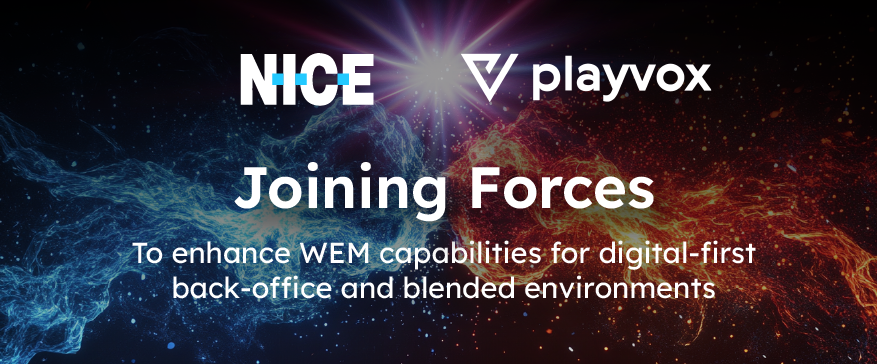The Role of AI in Streamlining Quality Management Processes
One thing that’s certain is change. This definitely applies to customer needs and preferences, and contact centers are constantly striving to stay one step ahead of evolving customer requirements.
A desire for instant-access self-service options is shifting how customers want to engage. Yet, should they need help with more complex issues, a knowledgeable, responsive agent should be ready to assist.
How do contact centers not only survive but thrive in this new era? And behind the scenes, how do you ensure your quality management (QM) processes are keeping up?
Artificial intelligence (AI) can play a part. Let’s examine the role of AI in streamlining quality management processes to help modern contact centers rise to the ever-changing customer experience landscape.
Customer Requirements and Preferences Have Changed
Customer expectations and preferences for service and support have shifted dramatically in recent years. They know what they need, want speedy resolution or help, and are willing to help themselves to the extent that it’s possible.
Here are the trends:
AI-Powered Self-Service Support
According to a recent Gartner survey, thirty-eight percent of Gen Z and millennial customers say they are likely to give up on a customer service issue if they can’t resolve it with self-service. And 62% of millennials and 75% of Gen-Z customers prefer self-service almost all the time, even when they have an option of contacting customer support. This compares to 19% of baby boomers and 43% of Gen X customers who report they would do the same.
This means that contact centers stand to benefit by leveraging AI tools, chatbots, and more and beefing up their knowledge library to make self-service an outstanding customer support option.
Seamless Omnichannel Experience
On the occasions when customers cannot get resolution with self-service options, they expect a seamless omnichannel experience. There’s little tolerance for having to provide identifying information and restating their request again to an agent.
McKinsey reports that around 75% of customers expect a “consistent cross-channel service experience.”
Personalized Service and Support
AI helps companies deliver products and services that are tailored to the needs and interests of customers and prospects. According to McKinsey, 71% of consumers expect companies to deliver personalized interactions, and 76% of them get frustrated when it doesn’t happen.
In response to these trends and preferences, contact center leaders are retooling and streamlining quality management processes, leveraging AI along the way.

Ever-Evolving Quality Management Processes
Not long ago, call centers had one channel — voice — and quality assurance (QA) focused on checking compliance boxes or meeting regulatory requirements. Either agents did or did not perform satisfactorily.
But today’s customer expectations, behaviors, and preferences for communication mean that there’s a lot more gray. Different channels call for different methods of handling customers, and they can’t be measured the same way across the board. Customers have different expectations for service in each channel, and agents should act — and be measured — accordingly.
The shift means that customer experience excellence is now focused on whether the customer left the interaction with a satisfying resolution and will remain loyal to the company. Today, many quality analysts are still focused on processes — whether agents are doing as they’ve been instructed. Instead, contact center leaders and analysts should focus on measuring the experience as part of the greater strategic business goals.
Quality Management and the Modern Contact Center
Making the shift from quality assurance to quality management means focusing on the success of the quality program for customers, agents, and the company as a whole. Quality management in a modern contact center encompasses the people, processes, and systems in a holistic way.
Contact center leaders need to embrace:
- Massive amounts of data which are now available. Data from omnichannel customer touchpoints — calls, social media, email, online chat, and more — provide companies with greater insights on customers. Contact centers on digital transformation journeys are leveraging data as a competitive differentiator.
- Cloud-based tools and advanced technologies such as generative AI (GenAI) to support remote and hybrid agents and customers around the globe.
- The need to minimize labor costs and gain operational efficiency while delivering excellent customer and employee experience (EX).
- Workforce engagement as part of the QM equation. Generally engaged workers care about their performance and the performance of the company and feel that their efforts make a positive impact on customers. Agent engagement has the power to make or break customer satisfaction, impacting not only your quality management program, but the bottom line.
With its rapid rise in popularity, contact center leaders are more aware than ever of what AI can do for their organizations, particularly in the area of quality management.

The Role of AI in Streamlining Quality Management Processes
The use of AI has enormous potential in the contact center: McKinsey reports that using generative AI in customer care functions could improve productivity by 30-45%.
Reduce Time-Consuming Agent Processes
AI has proven to be an effective tool for automating time-consuming processes that are often prone to human error. By automating processes, such as extensive, repetitive manual data entry, contact centers can free up employees to spend time solving customer issues.
Improve Workforce Management and Optimization
AI has also found its way into plenty of processes that once took up a lot of time for managers. That’s especially true when it comes to workforce schedule optimization, where AI has helped companies optimize forecasting, considering several factors such as employee availability, customer traffic, and agent skill sets and preferences – all at once to identify the optimal staffing needs.
In addition, AI-powered workforce management software elevates employee engagement and empowers agents by supporting shift swaps within the team as well as time off requests. Agents can also gain access to real-time data so they have a clear understanding about their performance metrics, and where they need to adjust to provide exceptional experiences.
Analyze More Interactions
Due to the sheer volume of data they produce, most contact center analysts only analyze a small percentage (<2%) of interactions. Because proper evaluation takes several minutes or longer to complete, there’s simply not enough time in the day to analyze every single interaction.
But looking at such a small number means you might not actually be meeting customers’ needs and delivering quality service — you could be missing valuable insights. Worse yet, looking at a small sample might mean you’re coaching agents to improve in the wrong areas, resulting in wasted time, effort, and money.
That’s why it’s important to analyze 100% of your interactions. An AI-infused quality management solution can analyze the sentiment in every single interaction and find the ones that need review so you can spend more time fixing issues rather than simply identifying them. AI can surface the most pressing issues across a large sample and direct them to your quality analysts for a deeper look.
Automate Workloads and AI-Assisted Scoring
For analysts, automation and AI can take away some of the manual processes that make a proper evaluation take so long. Automated workloads can queue up interactions for the analyst so they spend less time searching and more time extracting data-driven insights. You can also create different queues based on the type of interactions to target the areas where they need the most improvement in customer experience.
AI can also assist analysts in the scoring and feedback process to cut effort and time. The right solution can automatically assign coaching to help agents improve faster and save time for the analyst. Agents can self-review the coaching and immediately put into practice tactics to create better customer outcomes
By automating workloads and using AI-assisted scoring, contact center leaders can make quality analysts’ work more consistent and thorough. They are able to better spot trends and potential quality issues and judge agents more fairly. These tools also allow analysts to quickly get full insight into every interaction for a big-picture view of quality that provides strategic insight to deliver better CX and make data-driven decisions.
Augment Feedback and Coaching
AI-infused software can do more than just speed up the evaluation process for analysts. When you automate your coaching recommendations, agents can be seamlessly directed to the appropriate coaching for their biggest challenges. By analyzing a larger sample of interactions with automation and AI, you’ll find agents’ trouble spots more easily — and address them faster.
This is a win-win-win for analysts, managers, and agents, who feel more empowered to better serve customers with faster, better coaching and feedback.
Better Understand and Act Upon Customer Sentiment
Understanding your customers’ behavior and what’s bringing them to your contact center plays a crucial role in helping you deliver better service. Both topic categorization and customer sentiment build this deeper understanding of customer needs and behavior.
Topic categorization is an AI-driven process that helps you uncover valuable insights of what’s driving interactions in your contact center. Customer sentiment gives you insight into the customer’s overall opinion of the interaction from beginning to end, helping you predict if a customer is a churn risk or needs follow-up. Understanding — and acting on — sentiment helps maintain customer loyalty and revenue for the long haul.

How to Integrate AI into Your Quality Management Processes
In order to ensure that your analysts, agents, and managers are on board with the use of AI technology to help streamline quality management processes, it’s important to ease into changes.
Here are five tips to help with a smooth transition.
- Review your current quality management processes and understand how they need to morph and where AI can help. Technology is only as good as the processes behind them, so it’s important to start with this step and find the right AI-powered tools that provide the greatest impact to your QM processes and are aligned to your quality objectives.
- To maximize stakeholder support, you can’t over communicate the value of AI tools to agents, analysts, and to the company as a whole. Help them understand how it will empower them in their roles, with the ultimate goal of improved EX and CX.
- Embrace a phased-in, systematic approach when rolling out an AI-infused solution. Start with the areas of greatest impact and “quick wins” to demonstrate the benefits to the organization. Seek feedback along the way from those using the tools, and especially from analysts and agents. Gauge their experience and enthusiasm, and incorporate best practices into additional implementation plans.
- Incorporate employee training into your rollout plan. Make sure your team is well-versed and comfortable with the use of AI-powered systems by providing comprehensive training and ongoing support. This will help them effectively leverage the technology, mitigate potential risks of failure, and contribute to the successful integration of AI into your quality management processes and workflows.
- Engage in continual improvement along the way. No rollout is flawless, so it’s important to seek agent, manager, and customer feedback and tweak processes as you go along.
The many key benefits of AI in streamlining quality management processes make the investment a good fit for contact centers that want to:
- Gain improved efficiencies by automating manual tasks, processing and analyzing data faster, and better allocating talent and resources. These also add up to cost savings.
- Enhance accuracy by reducing human error in the quality management process. In addition, if agents are consistently having issues with the same procedures, AI can help identify them faster so you can work to fix those processes and make them more effective.
- Stay ahead of the curve by spotting customer and agent trends and opportunities for improvement, providing a competitive edge.
- Provide a better agent, analyst, and customer experience.
Ready to learn more? Check out our on-demand webinar “How to Infuse AI Into QM: What You Need to Know.”







